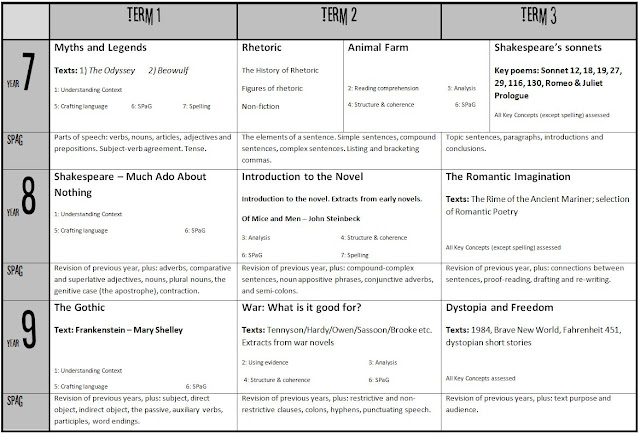Welcome to Downstairs in H Block, the new English Department Blog where we'll be posting tasks and resources to keep you going with Year 9 English until we're back in school.
You can follow this blog by email for updates whenever there is a new post. Just pop your email address into the 'Follow by email' box on the right of the screen.
You've now reached the final unit in our KS3 literary odyssey. Here's a reminder (Year 7 has changed a little since you did it):
We're sorry we had to cut the War Poetry unit short. If you didn't get the chance to see it, I'd strongly recommend watching this brilliant documentary about the life of the great war poet, Wilfred Owen.
Now, on to 'Dystopia and Freedom'. In this first blogpost, you'll learn about the conventions of dystopian literature and read an extract from a first dystopian text.
Task 1:
Read the following explanations. It would be a good idea to make notes, write down definitions etc. You might want to use Cornell notes to do this. The title is underlined below:
So, what is a DYSTOPIA?
To put it as simply as possible, a dystopian novel can be described as a dark vision of the future.
·
"An
imaginary, wretched place, the opposite of Utopia."
·
"An
imaginary place where people lead dehumanized and often fearful lives."
·
"The word 'dystopia' is the commonly used antonym of
'eutopia' [i.e. utopia] and denotes that class of hypothetical societies
containing images of worlds worse than our own. [...] Dystopian images are
almost invariably images of future society, pointing fearfully at the way the
world is supposedly going in order to provide urgent propaganda for a change in
direction."
·
"[...]
dystopian fiction looks at totalitarian dictatorship as its prototype, a
society that puts its whole population continuously on trial, a society that
finds its essence in concentration camps, that is, in disenfranchising and
enslaving entire classes of its own citizens, a society that, by glorifying and
justifying violence by law, preys upon itself. [...] dystopian society is what
we would today call dysfunctional; it reveals the lack of the very qualities
that traditionally justify or set the raison d'être for a
community."
·
"A
dystopia is any society considered to be undesirable, for any of a number of
reasons. The term was coined as a converse to a Utopia, and is most usually
used to refer to a fictional (often near-future) society where current social
trends are taken to nightmarish extremes. […] Often, the difference between a
Utopia and a Dystopia is in the author's point of view. […] Dystopias are
frequently written as warnings, or as satires, showing current trends
extrapolated to a nightmarish conclusion. […] A dystopia is all too closely
connected to current-day society."
Task 3: Watch this clip on YouTube to develop your understanding...
Task 2:
Have a read through this introductory powerpoint. Again, jot down anything you find useful or interesting.Task 3: Watch this clip on YouTube to develop your understanding...
Some
optional extras:
We'll be back next week with an extract from George Orwell's 1984.
Stay safe,
THE ENGLISH DEPARTMENT


No comments:
Post a Comment